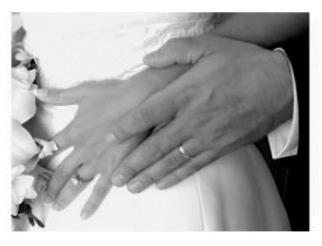When my grandfather walked me down the aisle, he was 90 years of age. He’d waited a long time for the privilege, and I knew he was relieved.
 Long gone were the requirements he’d outlined when I was 21, and 25, and passed along by phone to my mother when I hit 30 as he wanted to know what the problem was.
Long gone were the requirements he’d outlined when I was 21, and 25, and passed along by phone to my mother when I hit 30 as he wanted to know what the problem was.
My mother hedged, wary of telling him much of anything, and possibly embarrassed that she knew so little of my personal life.
That aside, one thing was clear: The “right boy” no longer needed to be from the “right” religious tradition, from the “right” family, toting credentials from the Ivy League.
He was happy I was marrying at all – finally.
How could I have conveyed that I was slow to make the commitment, in part because my father – his son – and my mother had divorced? How could I have explained what it was like growing up with their friction, and even more potent, my mother’s spillage of discontent?
I can only imagine my grandfather, were he alive today, would be disappointed to know my own marriage ended up in divorce. But I think he would love his great-grandsons. I think he would see that I made myself a decent life. I think that as he aged and we approached the millennium, he recognized how the world was changing – for better or for worse.
But I understand the worry about teenage and adult kids. I can only imagine what my own children have felt throughout the fallout of our family’s evolving configuration. I don’t wonder that they have preferred to socialize with friends as a group, and whatever relationships they’ve had, they keep close to the vest.
 I may want them to consider marriage slowly and carefully – very carefully – and not for some time. (My sons are still young; one in college, the other out one year.) But I do want them to know what it is to love and be loved – to grow through the necessary progression of that most precious process.
I may want them to consider marriage slowly and carefully – very carefully – and not for some time. (My sons are still young; one in college, the other out one year.) But I do want them to know what it is to love and be loved – to grow through the necessary progression of that most precious process.
When one of my kids mentioned that he was in a relationship and it was great, I found myself delighted to know that their dad and I hadn’t somehow “spoiled” the concept of love for them indefinitely. While my ex remarried fairly quickly after our divorce was final – statistics show there’s nothing unusual in that – it was years before I dated, years before I “fell,” years of dating ups and downs, and years (again) until a warm, stable, committed relationship. A good one.
Along the way, I wanted my sons to understand that sex is not love, that emotions are complex, that we live along a spectrum of experience that includes the intellectual, the emotional, the physical, the spiritual, the social, the political, and yes, the material.
I wanted them to explore – safely – and to learn some of the nuances in relationships in their own time, in their own way. I hoped, fervently, that my experiences and even my bitterness at times would not sour them to love.
Naturally, I cannot know what the future will bring for any of their amours, but it’s a relief to know that they’re venturing a toe in the waters. And that seems to include allowing themselves the pleasure and vulnerability that comes with love.
I know all too well – as do many of us who have weathered a few years of marriage and parenting – love isn’t enough to make “the world go round.” But it’s a great start.
Much as I may constrain my own behaviors and even the reach of my heart, I want for them what my parents wanted for me, what my grandfather surely wanted on that day so many years ago: affection, admiration, passion, trust – the elements of what we so often label “love.”
Related Links:
- On Bitterness
- How to Divorce-Proof Your Marriage
- The Unbroken Heart, the Marriage Container, the Marriage Trap
- Sex vs. Lovemaking: Why Are We So Confused?


Leave a Reply